Helen Keller inspired the world by learning to speak, read, and communicate expertly despite being both blind and deaf. Throughout her life, she had much to say on a variety of topics, and her writings and speeches are full of thoughts still worth pondering today. We’ve put together a list of the best Helen Keller quotes for the classroom on subjects like happiness, motivation, and more.
Use these quotes as journal prompts, morning meeting discussion starters, or even persuasive essay topics. Plus, get a set of five free printable posters featuring our favorite Helen Keller quotes for the classroom!
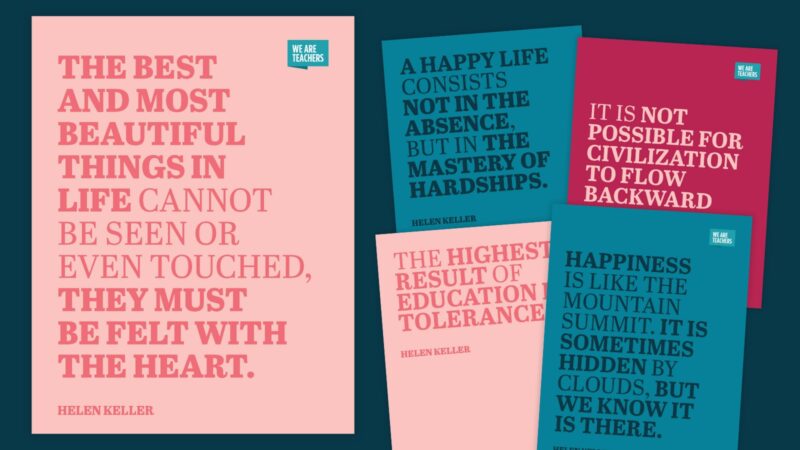
FREE PRINTABLE
Helen Keller Quotes Posters
Print and hang our bundle of five Helen Keller quotes posters. They’re free to download—just enter your email address in the form on this page!
Best Helen Keller Quotes for the Classroom
The highest result of education is tolerance.
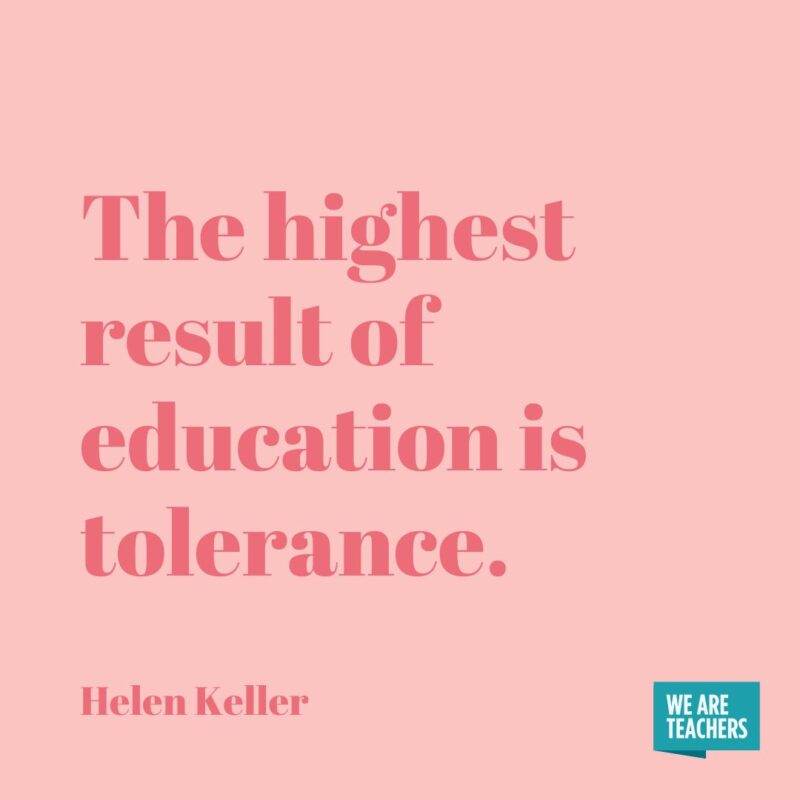
Journal prompt: How does education teach tolerance, and why does it matter?
Although the world is full of suffering, it is full also of the overcoming of it.

Ask students to look through news websites to find examples of both suffering and people overcoming it.
World peace will never come until the passion of supremacy is combated.
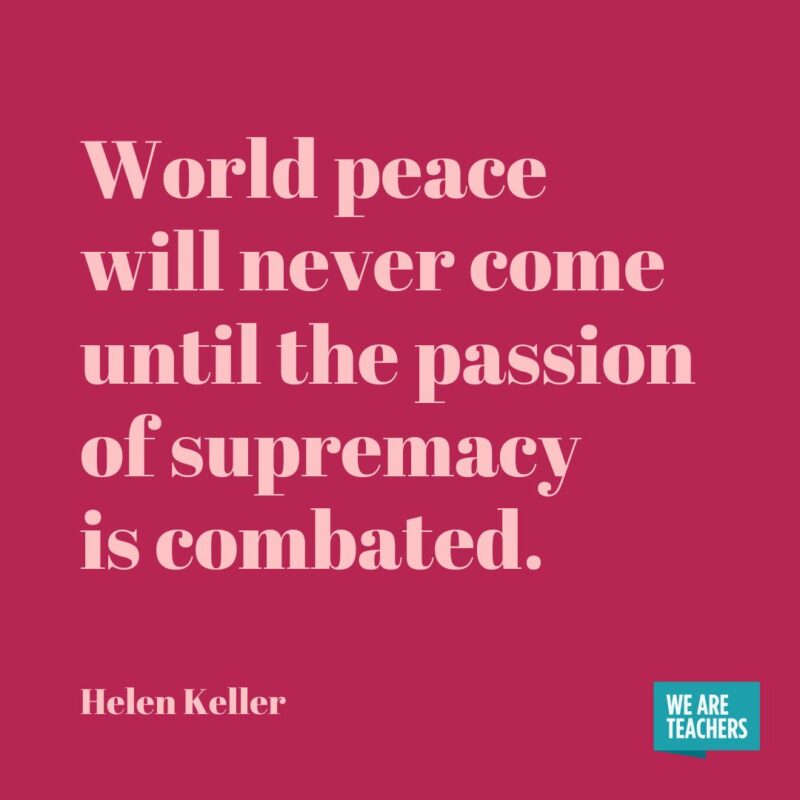
Spark a class debate: Is world peace possible, even if we could overcome “the passion of supremacy“?
What do I consider a teacher should be? One who breathes life into knowledge so that it takes new form in progress and civilization.

Teachers, share this one with your fellow educators, and consider how you “breathe life into knowledge” each and every day.
Smell is a potent wizard that transports you across thousands of miles and all the years you have lived.
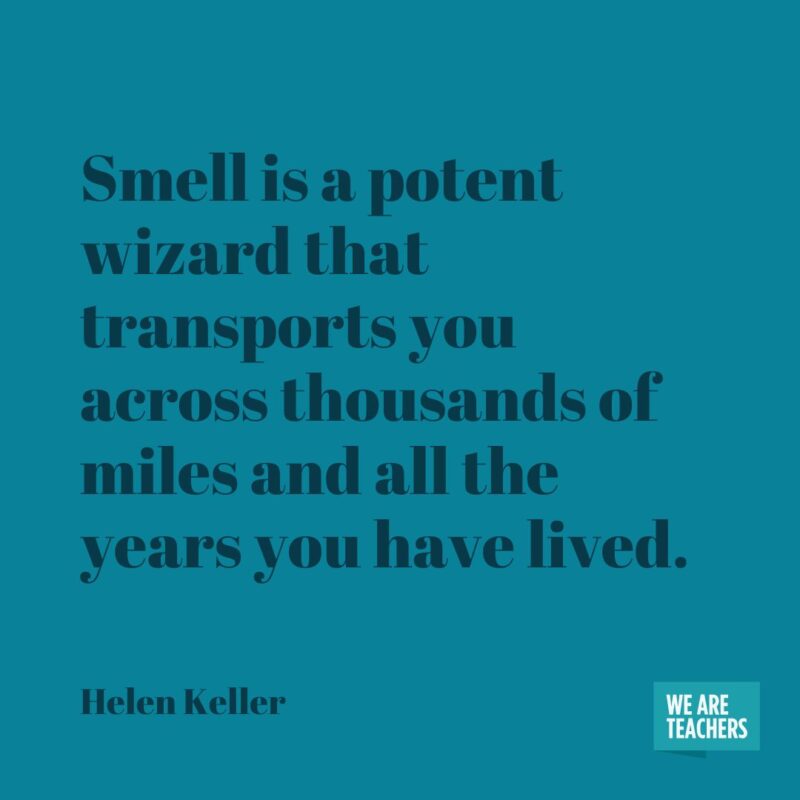
Journal prompt: Describe a specific scent and how it transports you to another place and time.
What we have once enjoyed we can never lose. All that we love deeply becomes a part of us.

This is an ideal quote to inspire personal essays about love and loss. Urge students to think about whether this Helen Keller quote is true for them.
Optimism is the faith that leads to achievement. Nothing can be done without hope and confidence.

Helen Keller spoke often about how vital optimism was to her. Research her life with your students, and look for examples of how she lived optimistically.
It all comes to this: The simplest way to be happy is to do good.
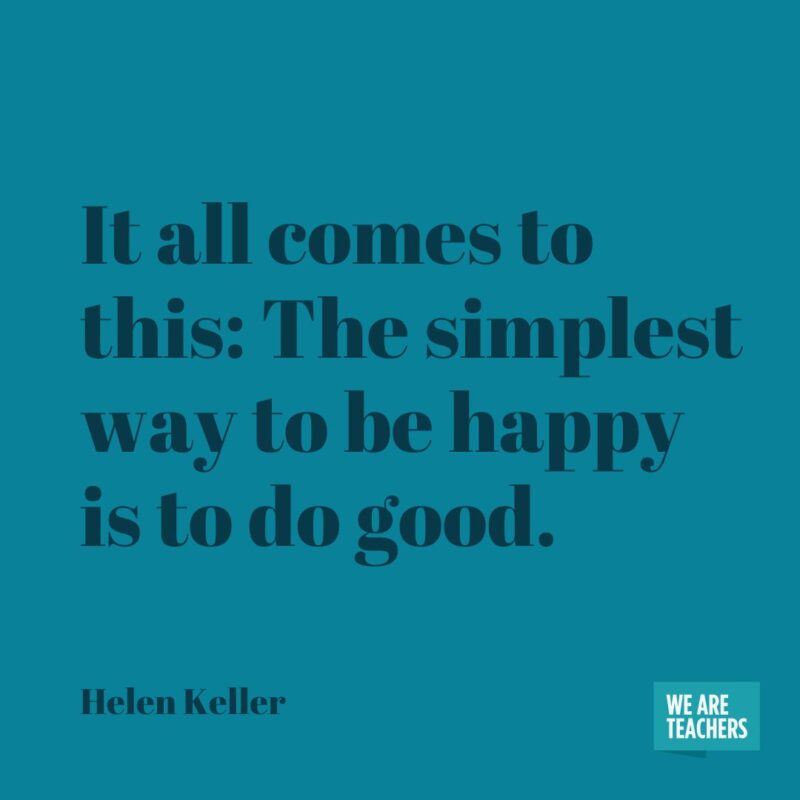
Debate topic: Does “doing good” really make people happier?
We can decide to let our trials crush us, or we can convert them to new forces of good.
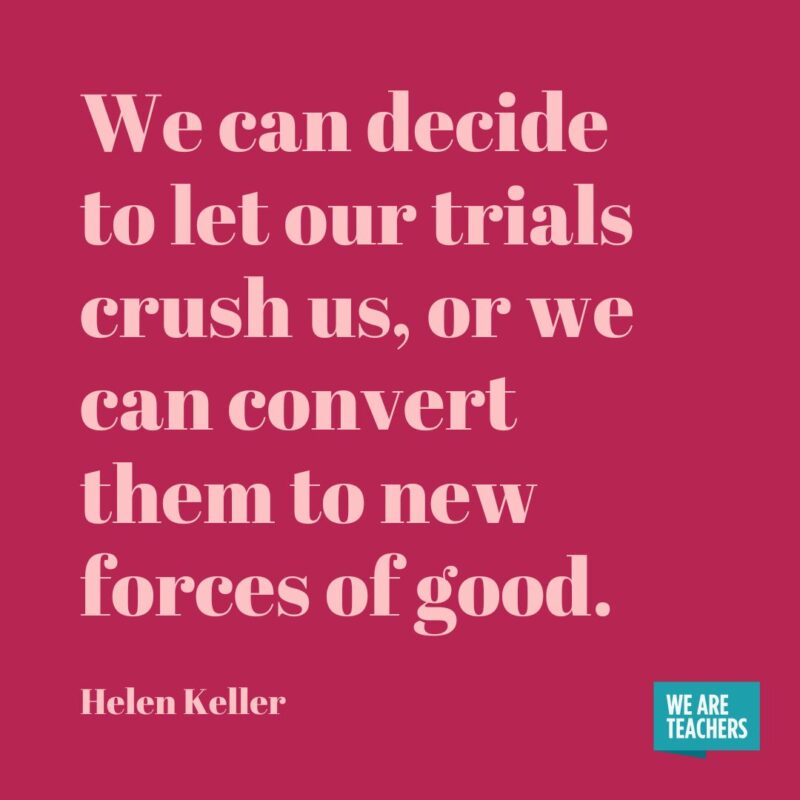
Journal prompt: Describe a time when you turned a trial into a triumph.
The civilization of a state should be measured by the amount of suffering it prevents and the degree of happiness it makes possible for its citizens.
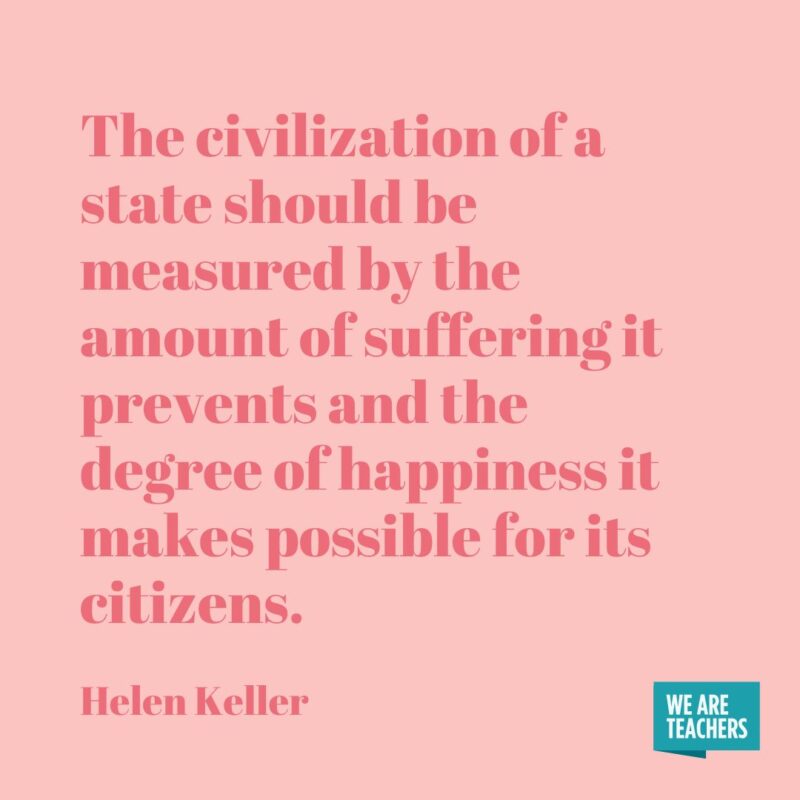
Encourage students to research statistics from countries around the world related to welfare and quality of life. How does a country’s approach to government affect its citizens?
When indeed shall we learn that we are all related one to the other, that we are all members of one body?
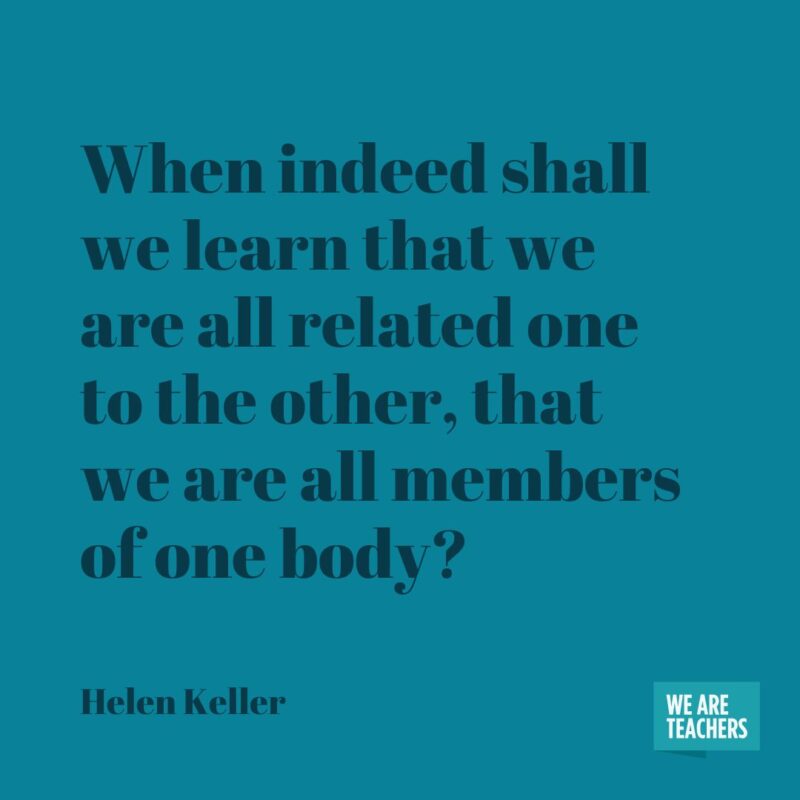
This quote is perfect for talking about teamwork. Use it as in intro to team-building games, where students must be “members of one body” in order to succeed.
One painful duty fulfilled makes the next plainer and easier.

What “painful duties” did Helen Keller tackle in her life? What about your students—what do they consider their own “painful duties”?
So long as the memory of certain beloved friends lives in my heart, I shall say that life is good.

Journal prompt: How do friends, past and present, make life good?
Happiness is like the mountain summit. It is sometimes hidden by clouds, but we know it is there.

These words immediately evoke mental pictures. Ask students to illustrate this Helen Keller quote, including the words, somewhere in their artwork.
He who is content with what has been done is an obstacle in the path of progress.
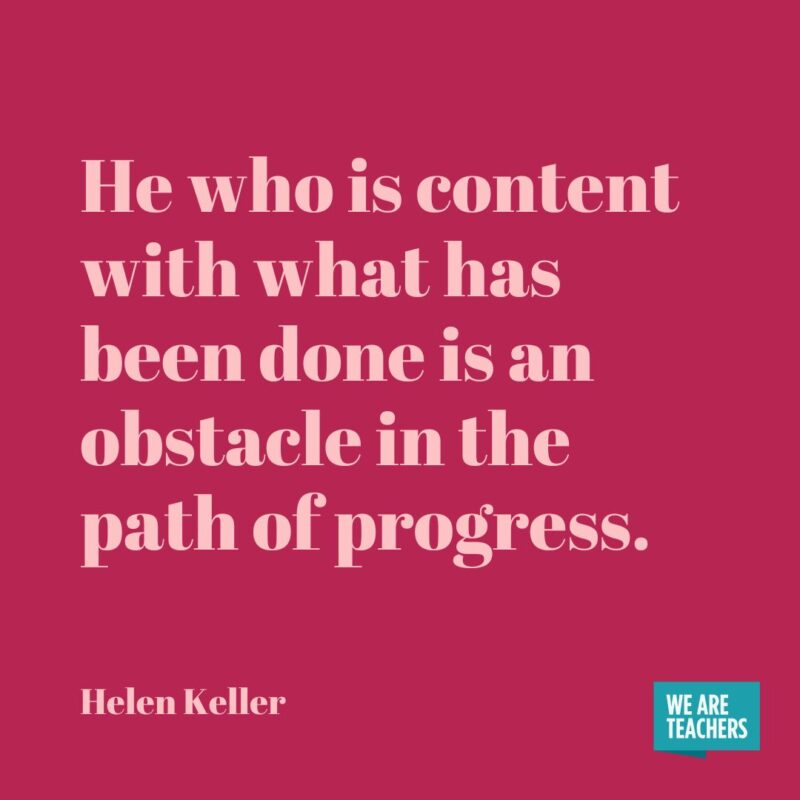
Ask your students: What’s the difference between celebrating past successes and standing in the way of continued progress?
Never bend your head. Hold it high. Look the world straight in the eye.

Think about times when it’s been hard to hold your head high. What made it difficult and why?
The best and most beautiful things in life cannot be seen or even touched, they must be felt with the heart.
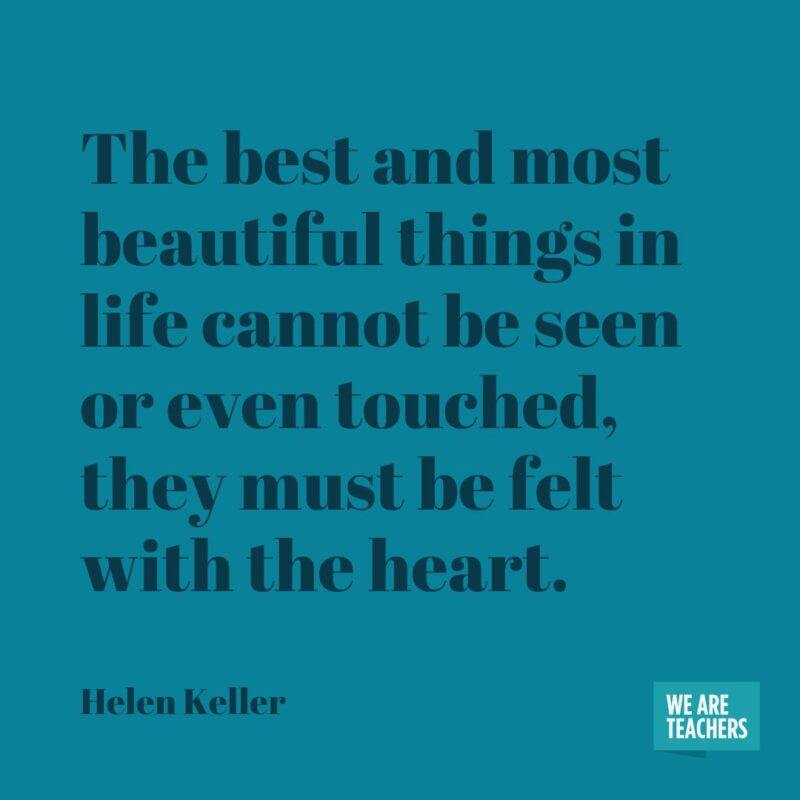
Journal prompt: What are some of the beautiful things in your own life that can only be felt with the heart?
A happy life consists not in the absence, but in the mastery of hardships.

Share this quote with your students when you talk about growth mindset, which is all about learning new ways to deal with challenging hardships.
It is not possible for civilization to flow backward while there is youth in the world.

As a teacher, your job is to see the potential in young people and all the promise they hold.
So long as you can sweeten another’s pain, life is not in vain.

Journal prompt: Tell about a time when you helped “sweeten another’s pain” by helping them during a difficult time. How did you help, and how did it make you feel?
Many people know so little about what is beyond their short range of experience. They look within themselves—and find nothing! Therefore they conclude that there is nothing outside themselves either.
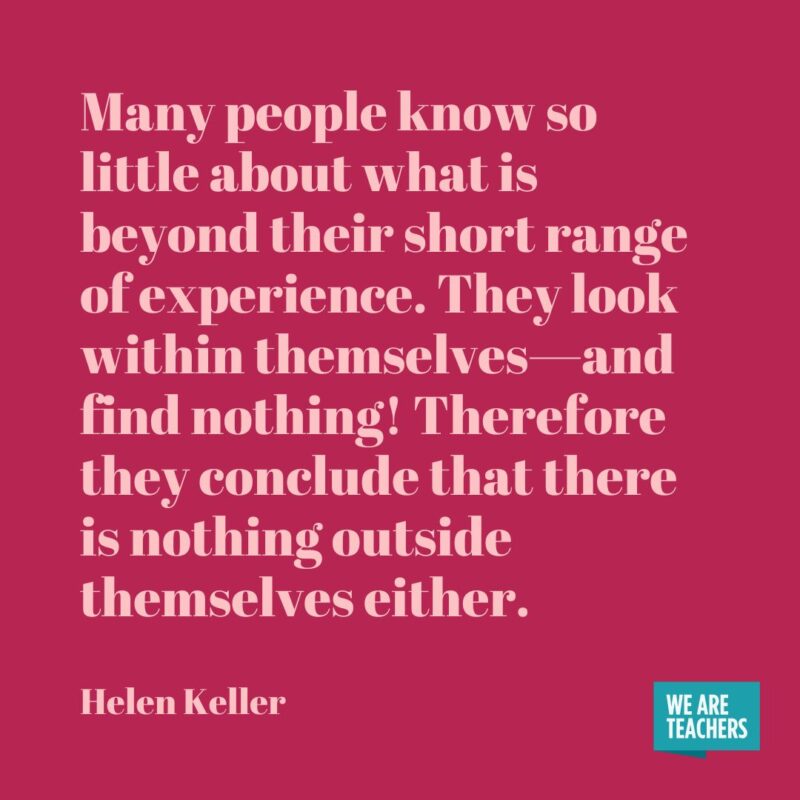
Teachers have a duty to help students expand their frames of reference and build a wider range of experience. Explore nine areas of your teaching to evaluate for diversity and inclusion here.
One can never consent to creep when one feels an impulse to soar.

Discuss this quote as a class. What does it mean to creep and to soar?
People do not like to think. If one thinks, one must reach conclusions. Conclusions are not always pleasant.
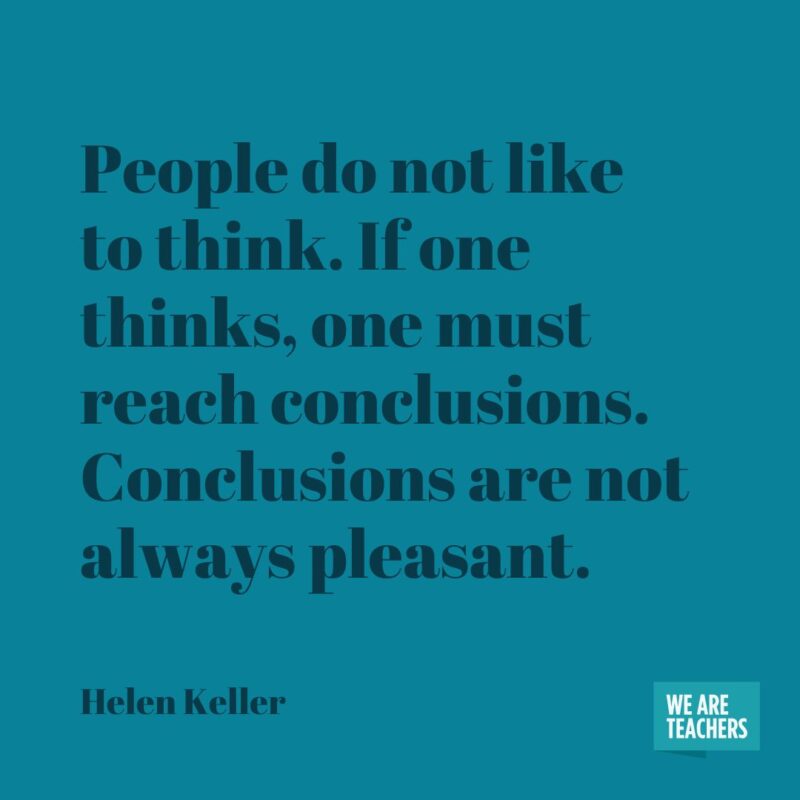
Journal prompt: What are some unpleasant conclusions you’ve reached in your life? What did you do about them?
“Knowledge is power.” Rather, knowledge is happiness, because to have knowledge—broad, deep knowledge—is to know true ends from false, and lofty things from low.
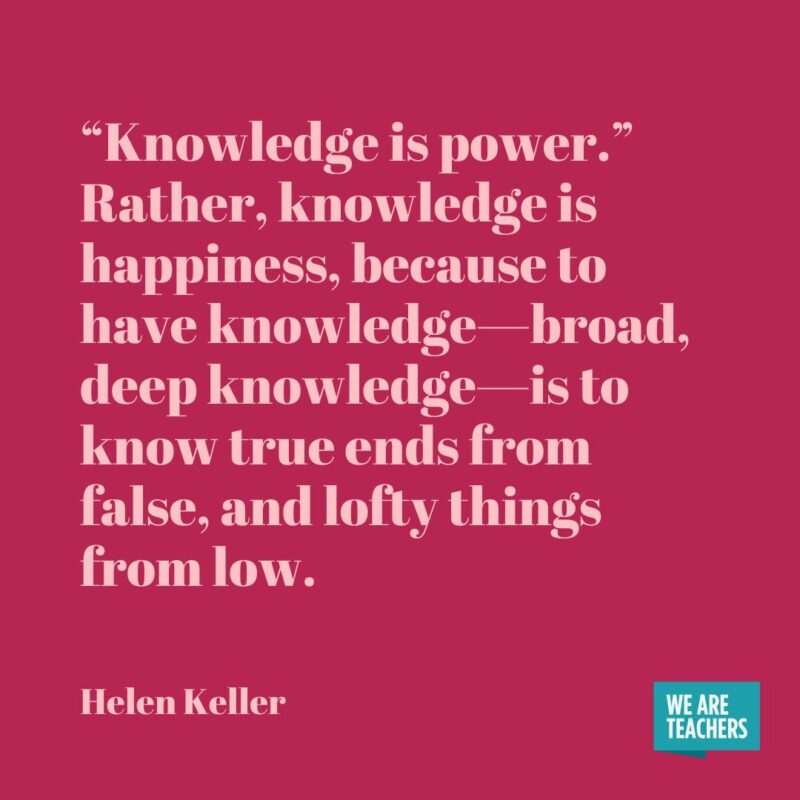
This is a good reminder of the importance of teaching students to think critically, so they can separate fact from fiction and “true ends from false.”
The chief handicap of the blind is not blindness, but the attitude of seeing people towards them.

As a seeing person and an educator, what is your attitude toward the visually impaired (and those with other disabilities)? (Plus, find 15 tips for teaching blind or visually impaired students here.)
When one comes to think of it, there are no such things as divine, immutable, or inalienable rights. Rights are things we get when we are strong enough to make good our claim on them.
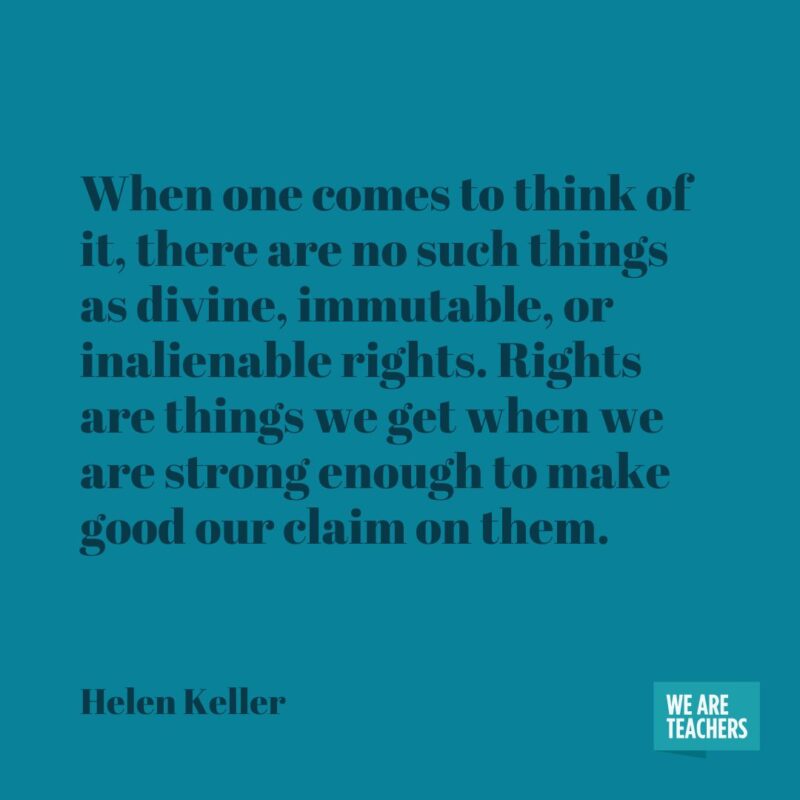
Debate topic: Are there any inalienable rights that people shouldn’t have to fight for?
We cannot freely and wisely choose the right way for ourselves unless we know both good and evil.

Ask your students: Why is it important to know both “good and evil”? What do those words really mean to you?
Toleration … is the greatest gift of the mind; it requires the same effort of the brain that it takes to balance oneself on a bicycle.

Essay topic: Compare learning to ride a bicycle with developing tolerance.
No pessimist ever discovered the secrets of the stars, or sailed to an uncharted land, or opened a new heaven to the human spirit.

Journal prompt: What is the definition of optimism? How is it related to success?
The marvelous richness of human experience would lose something of rewarding joy if there were no limitations to overcome. The hilltop hour would not be half so wonderful if there were no dark valleys to traverse.
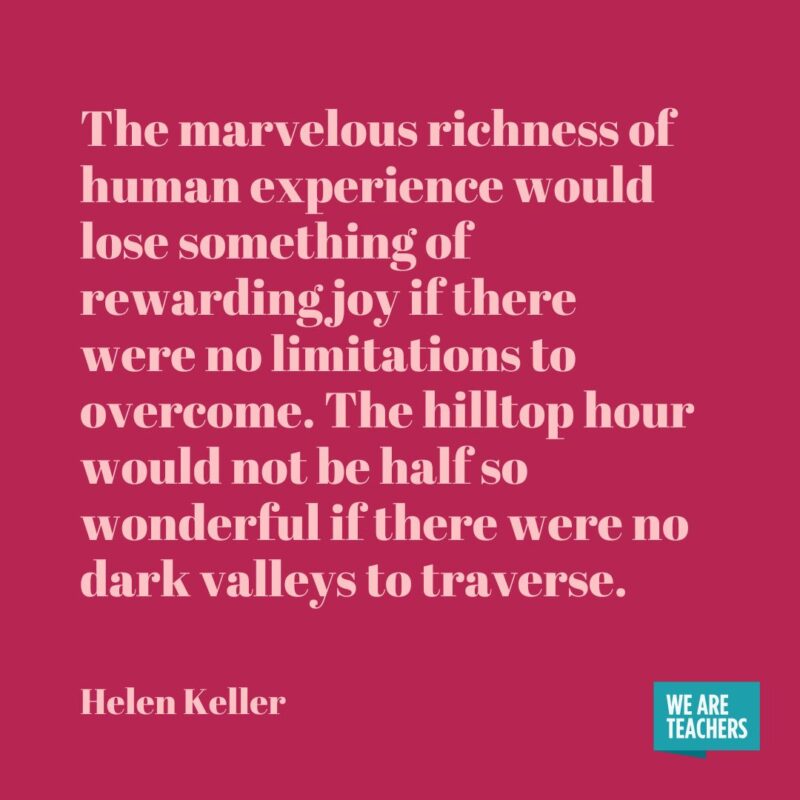
Here’s another quotation to use as an artistic prompt. Students can use the entire quote or only key words and phrases.
Get my printable posters!
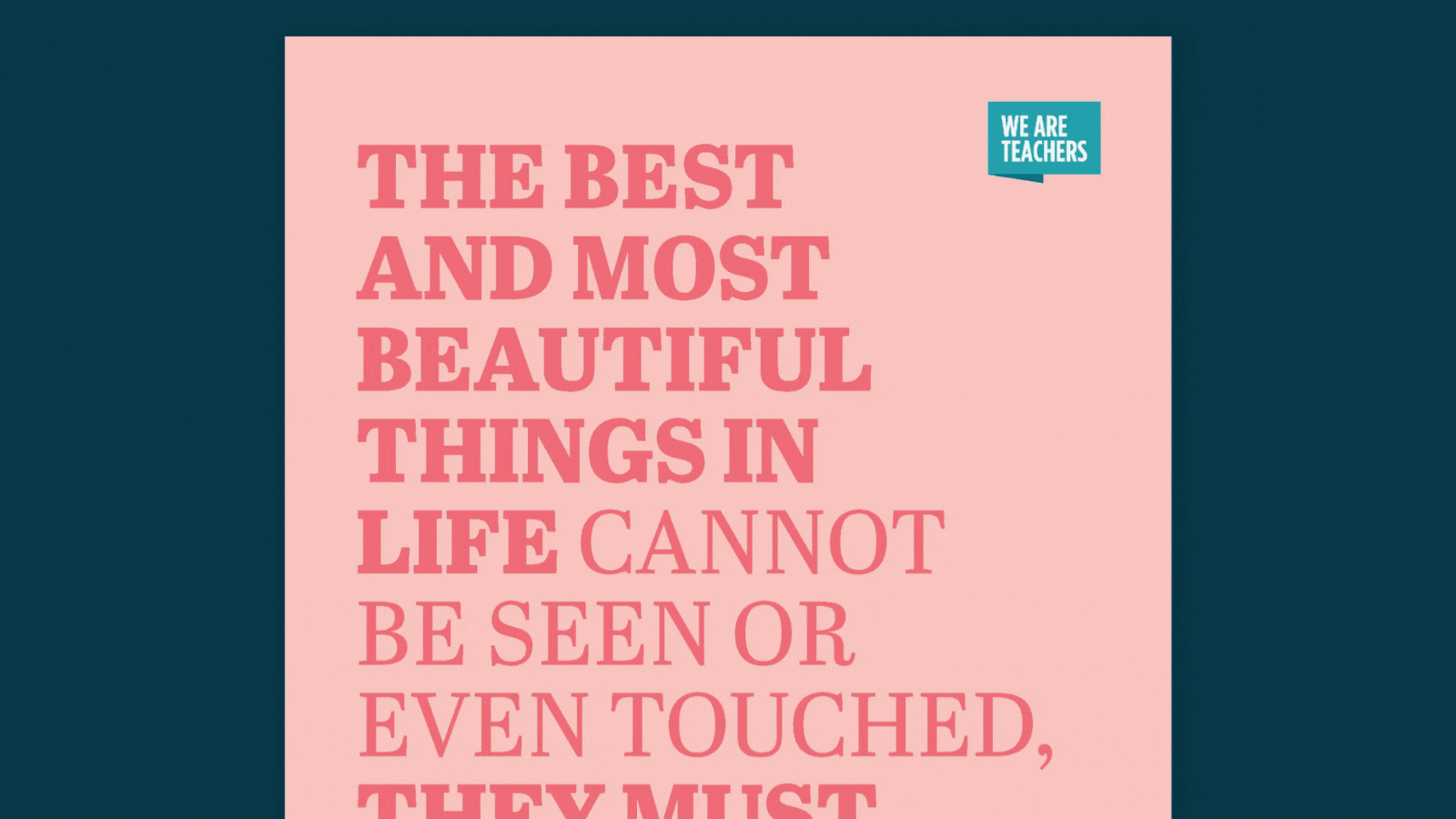
Don’t forget to grab your free printable Helen Keller quotes posters to hang in your classroom or school hallways!

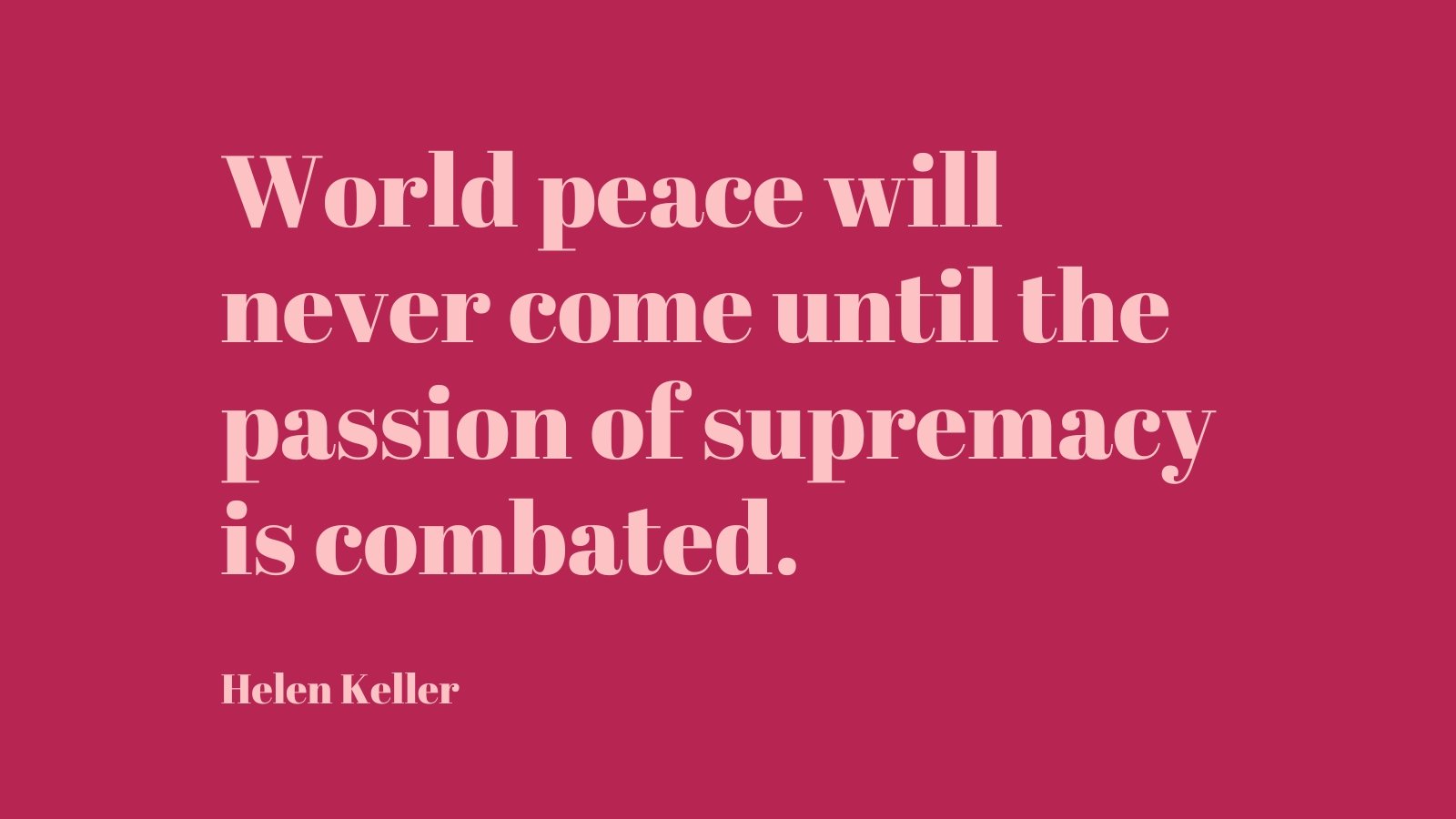
Recent Comments